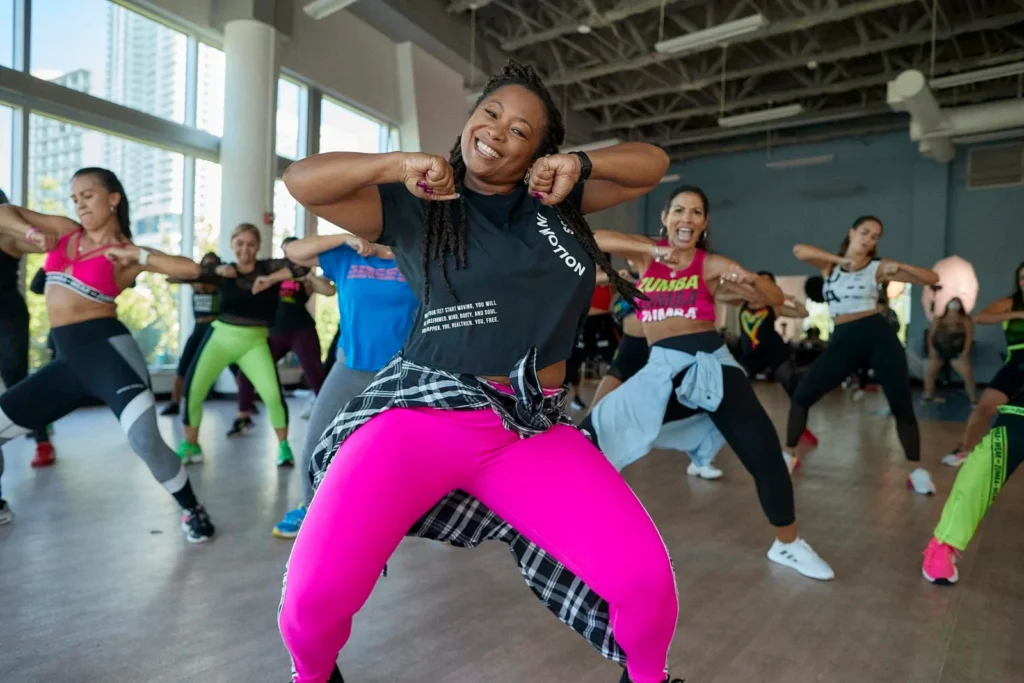ATN sat down with six leading brands and organizations that are shaping the fitness industry to get their insights on what’s next – and how fit pros can react, prepare and thrive in this new era
With the first quarter of 2025 already behind us and the HFA Show fresh in our minds, the biggest forces driving the industry forward are becoming crystal clear.
Recovery, wellness and longevity have become core pillars of the industry. AI is moving fast, infiltrating every aspect of fitness, and personalization remains the key to retention. Wearables are multiplying, evolving into data-driven ecosystems that feed into comprehensive health platforms. GLP-1 medications are reshaping the fitness conversation, and hybrid experiences – inside and outside the gym – are booming, as is the continued demand for community and connectivity.
So, what does this mean for fit pros? How is the landscape shifting for personal trainers and group fitness instructors? What skills, specializations and strategies will they need to stay ahead, and how can they future-proof their careers in an industry that’s evolving at breakneck speed?
Athletech News sat down with six leading brands and organizations that are shaping the industry to get their insights on what’s next – and how fit pros can react, prepare and thrive in this new era.
ISSA Works To Create Well-Rounded Trainers
In addition to mental health and wellness, tech advancements and GLP-1’s, ISSA CEO Warren Heffelfinger says specialized programming for active aging populations and learning the business aspects of personal training are key areas where fit pros should focus their attention.
“Today’s fitness professionals need more than just technical knowledge – they must master behavioral coaching, data-driven programming, business skills and digital marketing,” Heffelfinger tells ATN. “Specialized expertise in areas like corrective exercise and medical weight management is in demand, while emotional intelligence and communication are essential for client success. Those who can blend these skills will not only thrive but also build sustainable, adaptable careers in a rapidly evolving industry.”
Recognizing these evolving demands, ISSA has expanded its offerings with programs like the Health Coach Institute’s Pathway Program, a Business of Personal Training course, specialized nutritional programming and more.
To operate effectively in today’s environment, Heffelfinger says fit pros must maintain adaptability, focus on continuous education in areas where human expertise adds the most value and dedicate equal attention to developing both technical expertise and interpersonal skills.

“Today’s fitness professionals need more than just technical knowledge – they must master behavioral coaching, data-driven programming, business skills and digital marketing,” says Heffelfinger. “Specialized expertise in areas like corrective exercise and medical weight management is in demand, while emotional intelligence and communication are essential for client success.”
NASM Embraces the ‘Wellness Evolution’
NASM CEO Mehul Patel notes that fitness and wellness are becoming intertwined.
“The personal training landscape is being reshaped by the wellness evolution, which has become an indispensable aspect of the fitness industry,” Patel tells ATN.
To that end, a recent NASM study found that trainers are most interested in expanding their knowledge in anti-aging and longevity, recovery and mental performance.
But with so much emerging information, trainers are feeling the pressure. That same NASM study found that information overload is the biggest challenge they face today.
“It’s a reality we take seriously, which is why our commitment is to distill the wide array of fitness information into clear, science-backed and applicable knowledge through our certifications,” says NASM chief commercial officer Kristin Carrico. “Our goal is to provide trainers with the precise information they need, without the excess that can lead to confusion and overwhelm.”
“It’s clear that in this rapidly growing field, with the Bureau of Labor Statistics predicting a 14% increase in demand for fitness professionals by 2032, the ability to specialize is more important than ever,” Mehul adds. “Trainers have the opportunity to hone their skills in specific areas they’re passionate about and position themselves as authorities in their chosen fields.”

“Our commitment is to distill the wide array of fitness information into clear, science-backed and applicable knowledge through our certifications,” says Carrico. “Our goal is to provide trainers with the precise information they need, without the excess that can lead to confusion and overwhelm.”
ACE Sees the Opportunity in AI, GLP-1s
Lauren Shroyer, MS, vice president of product innovation at the American Council on Exercise (ACE), points to anti-obesity medication, also known as AOMs, and AI as two of the top trends shaping personal training and group fitness – and opening doors.
“While AOMs are shifting the landscape of weight management, long-term success still hinges on sustainable lifestyle changes,” Shroyer says. “This creates a major opportunity for fitness professionals to become the center point of lasting health by offering behavior change coaching.”
“Trainers and facilities that leverage AI-driven insights will be able to deliver more responsive coaching, ensuring workouts adjust dynamically based on recovery, effort and progress,” she adds.
ACE is working to balance these tech advancements with a commitment to delivering high-quality, immediately applicable education.
“We leverage AI for efficiency while ensuring that subject matter experts – who are active practitioners – shape our content to maintain credibility and industry relevance,” Shroyer explains.
Her advice for fit pros? In addition to finding the balance between tech and personalization, Shroyer says expanding expertise beyond exercise to include sleep, stress management and recovery is critical.
“As clients seek a more holistic approach, those who embrace these changes in the landscape will come out ahead,” Shroyer believes.

Les Mills Brings AI, Gamification to Group Fitness
Les Mills is seeing a major shift in what gym-goers expect from their workouts, and according to Sean Turner, CEO of Les Mills U.S., younger generations are leading the charge toward more immersive, experience-driven fitness.
“Millennials and Gen Z now make up over 80% of gym-goers, and they want more than just a workout – they want a full experience,” Turner tells ATN.
That experience goes beyond movement. Today’s fitness consumers are drawn to high-energy, community-driven classes with digital integration.
“AI-driven fitness, gamification and real-time data tracking are changing how people train, and the next frontier is personalization – ensuring members get workouts tailored to their goals and performance levels, when they want, where they want,” Turner explains.

To meet this demand, Les Mills recently launched Ceremony, designed to deliver results while maintaining the energy and motivation of a live class. They’ve also expanded their strength training lineup with Les Mills Strength Development.
“We’re pushing the boundaries of group fitness with cutting-edge sound and visual technology, making workouts more immersive and interactive,” Turner explains. “Programs like The Trip, our immersive cycling experience, along with Les Mills Bodycombat VR and Les Mills Dance VR on Meta Quest headsets, are attracting the next generation of members. AI-driven fitness, gamification and real-time data tracking are changing how people train, and the next frontier is personalization – ensuring members get workouts tailored to their goals and performance levels, when they want, where they want.”

Zumba Makes the Case for Fun, Accessible Fitness
Zumba chief marketing officer Carolina Moraes also emphasizes the importance of specialized programming in meeting the evolving demands of the industry.
“We are always exploring how to evolve our specialty offerings so people who are already in the Zumba ecosystem can have all their fitness needs addressed,” Moraes tells ATN.

While AI, wearable tech, and anti-obesity medications are shaping industry trends, she is particularly encouraged by the increased focus on women’s health and fitness needs, which are now at the forefront of critical conversations.
For Zumba, inclusivity remains a driving force.
“We know over 70% of Americans don’t work out and intimidation is a big factor,” she says. “Facilities should offer programs like Zumba that welcome all levels while also providing ongoing support to members and celebrating their achievements, big and small.”

Wellhub: Bridging the Gap with Hybrid Fitness
In terms of inclusivity and meeting people where they are, Pietro Carmignani, EVP of Partnerships at Wellhub says, “People want fitness to seamlessly integrate into their daily lives, making accessibility a key priority. That’s why the hybrid fitness model – blending virtual and in-person training – is so important.”
Wellhub’s integration of wellness apps, gyms, and studios also allows trainers to easily create this hybrid fitness experience, combining virtual coaching with in-person resources. Within the platform, trainers and clients can leverage a range of in-app tools – including video, text, and voice messaging, structured workout schedules, and real-time health metric tracking – to create a personalized, effective, and sustainable fitness experience.
“The key to retention isn’t just access–it’s creating a support system that keeps clients motivated and accountable well beyond their initial sign-up, said Carmignani. “People want fitness to seamlessly integrate into their daily lives, making accessibility a key priority. That’s why the hybrid fitness model – blending virtual and in-person training – is so important.”

Fitness pros face an exciting but challenging future. It’s becoming clear that the most successful trainers won’t just adopt new tech — they’ll blend it thoughtfully with genuine human connection. The winners will be those who can harness AI and wearables while still delivering the personal touch that keeps clients coming back. Personal trainers are expanding beyond traditional exercise into recovery, longevity and mental wellness, creating community spaces where everyone feels welcome. Staying curious and continuously learning isn’t optional in today’s fitness industry — it’s essential.





























































